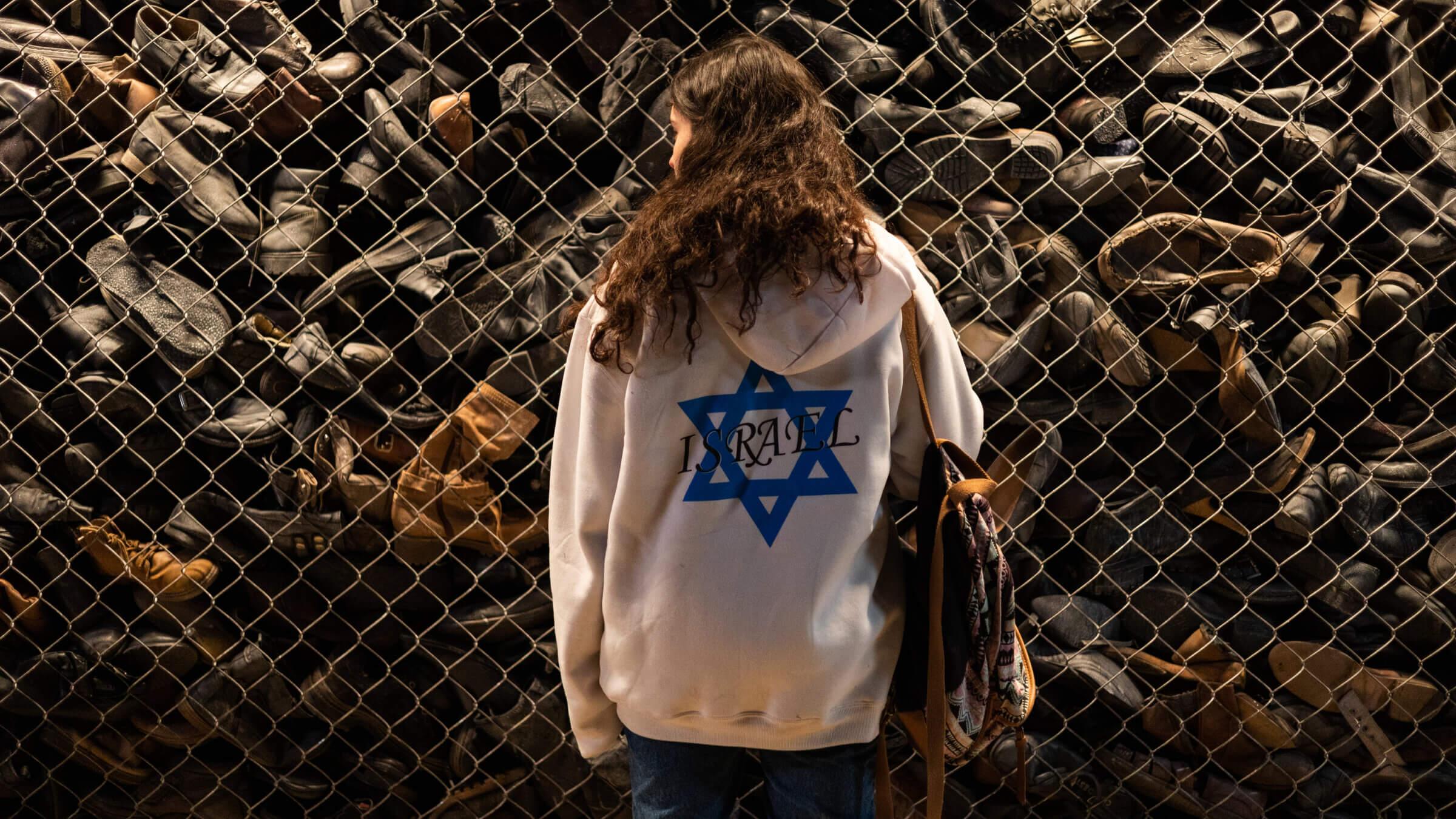In ‘Delegation,’ Auschwitz and Majdanek provide the the backdrop for a mumblecore teen heritage tour
Asaf Saban’s film is an uneven look at Israeli high schoolers and the Holocaust

Naomi Harari as Nitzan, who takes a shoe from the pile at Majdanek. Photo by @Natalia Łączyńska
Israeli teens Frisch and Nitzan are watching their friend Ido have a chat with his girlfriend, Liron. They don’t like her. They act out their imagined conversation — Frisch puts on a falsetto and makes up a story about how Liron cheated with a guy in the IDF. The scene would be completely pedestrian — and in a sense it is — were they not all standing in the ruins of a Jewish cemetery in Poland.
Asaf Saban’s Delegation follows a group of students, about to graduate and join the army, on a supervised school trip to sites of the Holocaust. Against the backdrop of Treblinka, Auschwitz and the remnants of the Jewish ghettos, the group lives out the typical dramas of kids in their late teens.
Nitzan (Naomi Harari) loves Ido (Leib Levin), but he’s not interested. Frisch (Yoav Bavly), whose survivor grandfather Yosef (Ezra Dagan) came along to share his story, is hoping to get laid. In between tearful detours to see concentration camp barracks or sit in cattle cars, the class party in their hotel rooms or sneak off to the pool to smoke and navel gaze about what they’ll do with the rest of their lives.
Saban, who also wrote the screenplay, has a deft feeling for how aimless kids behave when left to their own devices. Their small concerns don’t dissipate amid reminders of genocide, but are in fact amplified. Yet for all the film’s angsty verisimilitude — a sort of heritage tour mumblecore — it loses its own direction in the final act.
Nitzan steals a shoe from the Majdanek concentration camp, acting out in a token instance of blasphemy whose symbolism is as forced as it is hazy. Frisch makes jokes — chiding their chaperone for doing a headcount of Jews in Poland of all places; likening a hotel bathroom to the train cars they visited earlier in the day — and later sneaks off at a rest stop. No one notices he’s gone and, after hitching a ride with a local, he ends up becoming a sort of Jew mascot for the mayor of a Polish town.
Larger themes, like the historical wonder that is young Jews promenading through Poland with Israeli flags, or the pressure to make a statement with one’s life after bearing witness to reminders of death, aren’t given the consideration they deserve. Throughout the film, secondary characters meditate on how the tour has left an impression. One fears he hasn’t cried yet, another says that, after seeing Auschwitz, he’s sure he wants to serve in a combat unit when he enlists in the IDF.
But these moments, along with the occasional reminders from the group’s security detail to “keep a low profile” while navigating some Polish towns, are sidelined for the core trio’s poorly defined frustrations.
It’s refreshing that the film doesn’t get too ambitious, but the way the plot resolves — with an improbable and hollow wish fulfillment — renders much of the well-observed realism moot. (I won’t spoil it — let’s just say it wraps up much like one of the more ridiculous subplots in Love, Actually.)
Unevenness aside, the cast of young performers and the interesting setup make Saban’s movie worthwhile. And the good news is his concept is not yet exhausted.
While waiting in line for the bathroom at a gas station, the class encounters another delegation from a school in Northern Israel. And at Auschwitz, Yosef observes another survivor sharing his testimony with another group.
I’d like to hear more. I’m sure they too have a story worth telling.
The film Delegation is playing at the New York Jewish Film Festival Jan. 21 and 22. Tickets and more information are available on the festival’s website.





















